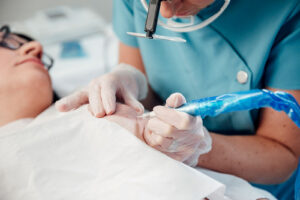
By Lauren Lopriore
In 2015, I was diagnosed with stage III triple-positive breast cancer. I was put on a roller coaster, but I felt I would never be fully ready to throw my hands up. It wasn’t until a few years later that I found support programs, sought out therapy and began prevention conversations to keep me on the ever-changing tracks of my cancer journey. My medical team was exceptional, but their focus was treatment. Minimal information was provided regarding lack of appetite, nausea, exhaustion, the loss of my hair and menstrual cycle, and coping with my emotions. I clearly wasn’t prepared for long-lasting effects, like neuropathy, fertility complications, intimacy challenges, having to be careful with my diet and managing prescriptions. I also wasn’t prepared for the effects my cancer journey had on my mental health and my relationships with others, or that I would have to refocus my whole life toward cancer prevention.
At the time of my diagnosis, a blood test would confirm I was positive for BRCA, a gene mutation increasing my risk of other cancers. I would also learn more about my family history. You may have heard of women having a prophylactic mastectomy because of family history or the presence of a gene mutation, but have you heard about a prophylactic salpingo-oophorectomy? It is the removal of clinically normal ovaries during hysterectomy surgery to reduce the risk of ovarian and breast cancer.
Since my diagnosis, not only have I been enduring side effects of breast cancer treatment and quarterly monitoring appointments, but I’ve also had to make appointments at Northwestern Medicine’s ovarian cancer prevention program. In the program, patients receive an ultrasound and CA 125 blood test every three months. After monitoring my nutrition, exercise, side effects and fertility complications, it was time to schedule an oophorectomy and focus on prevention.
In June of 2018, I chose to have an oophorectomy to fully heal before my daughter’s birth via surrogate. Following surgery, the ultrasounds and CA 125 tests continued every three months, and I continued to take the drug tamoxifen, an estrogen receptor modulator for prevention. Before scheduling my oophorectomy, the original game plan was to monitor and remove my ovaries at age 40. Ultrasounds usually revealed benign cysts, varying in size, most likely due to tamoxifen, so doctors initially concluded my scans were “boring.”
When I had my oophorectomy, my gynecologist ended up removing my right ovary due to a clementine-sized cyst that was benign. Discussions I had with my oncologist and husband started to shift as well. Would I ever be able to carry a child, create more embryos, stop taking my preventative medication? I went through testing only to find out that my lining was too thin, and the increase in estrogen during pregnancy wouldn’t be the best for me. After re-evaluating, I chose to schedule a laparoscopic hysterectomy for February 2022.
Eight weeks of recovery came and went. I was moving slowly and easing into everyday tasks, but I also started feeling sharp pains near the incision spots, similar to the pains near my mastectomy incisions. My doctor said it sounded like scar tissue located where the laparoscopic instruments entered. She recommended scar massage. This was great information to have now, but knowing ahead of time would have lessened the anxiety.
I was prepared for the five scars that would cross my belly and the eight weeks of recovery time; I could even handle the news they were removing my cervix, too. However, there were some effects that I was not prepared for, including menopause.
I only started to discover what my body would experience through my relationship with our family photographer, who had been diagnosed with ovarian cancer. She also had a hysterectomy and became a top resource, sharing what she had gone through since her surgery. I researched symptoms of menopause, but only someone who has been put into early menopause through surgery can truly prepare you for what to expect. I also connected with a breast cancer survivor who also had a preventive hysterectomy. I turned to these women when I experienced migraines and pains for the first time. Before surgery, I was so focused on preparing my daughter and my family for the eight weeks’ recovery time, I never sat down to think about what it was going to be like after recovery — inside, outside and entering menopause at 36.
As a result of chemotherapy, I stopped having a cycle, and vaginal dryness was already something I unfortunately experienced, along with the hot flashes, chills and night sweats. However, I was not prepared for the weight gain, slow metabolism, mood changes, headaches and abdominal throbs from scar tissue. These menopause symptoms were highly elevated after surgery. But, on the plus side, I didn’t experience other typical symptoms like sleep problems or thinning hair. Being diligent about applying lotion, I was able to avoid dry skin, as well.
I found that acupuncture and physical therapy have helped with my symptoms. Pelvic floor physical therapy has been helpful with dryness and tightness, and acupuncture helps the hot flashes, but all of life’s other stresses, too. My hope is to keep managing the menopause symptoms as best as I can with these types of services and therapies.
Ovarian prevention appointments are now once a year. I was told that a hysterectomy was risk reducing, not risk eliminating, because the ovarian lining remains intact. To preserve your health also comes with mental and physical side effects that need to be addressed, in addition to changes that your body goes through. Having cancer isn’t just getting diagnosed and experiencing treatment. It changes your emotional and mental triggers, and how each part of the body functions. Patients are champions, no doubt, but even champions require access to knowledge, care and support.







